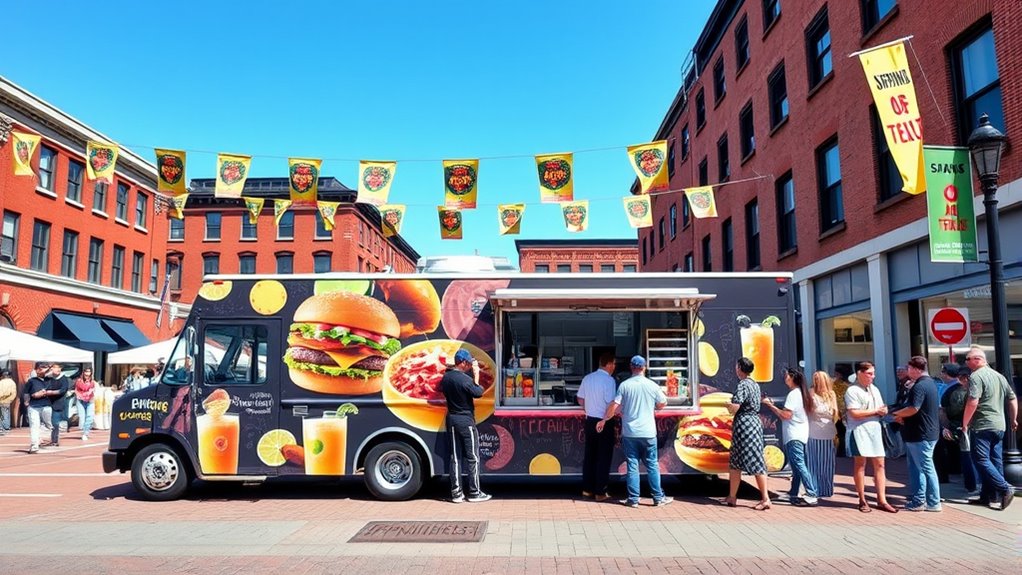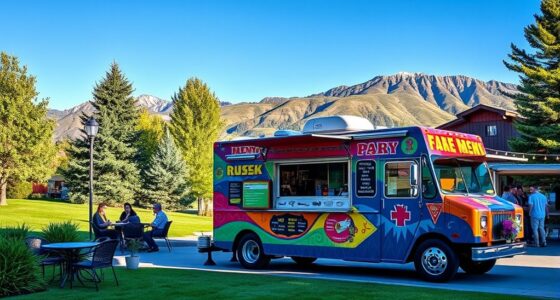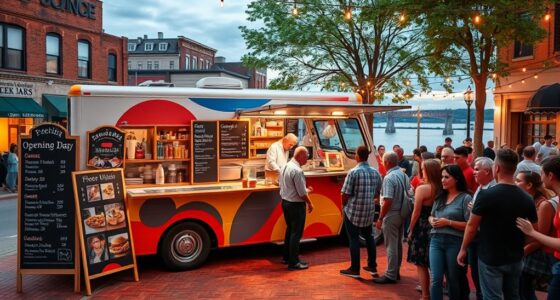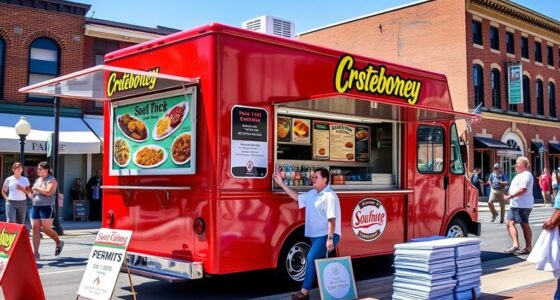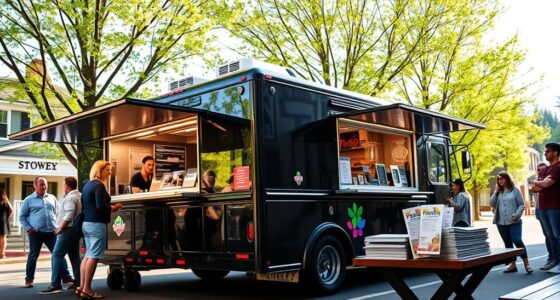To open a food truck in Manchester, NH, you need permits like a Food License ($150–$225) and a Mobile Food Permit from local health authorities. Budget $15,000–$175,000 depending on new or used trucks, plus about $45,000 for equipment. Choose busy spots like plazas or parks and stay within city zones. Keep your menu simple and safe, and use social media and local events for marketing. Learn more about staying compliant and successful.
Key Takeaways
- Obtain necessary permits including Food License, Mobile Food Permit, and event-specific licenses from Manchester and NH health departments.
- Budget $15,000–$175,000 for truck purchase/conversion, equipment, permits, initial inventory, and marketing expenses.
- Focus on designated city zones, parks, or private property with written permission, avoiding on-street and residential areas.
- Keep menu concise with 5–7 core items, emphasizing local flavors, allergen options, and operating from a compliant commercial kitchen.
- Use social media, participate in local events, and implement loyalty programs to boost visibility and customer engagement.
Navigating Necessary Permits and Licenses in Manchester
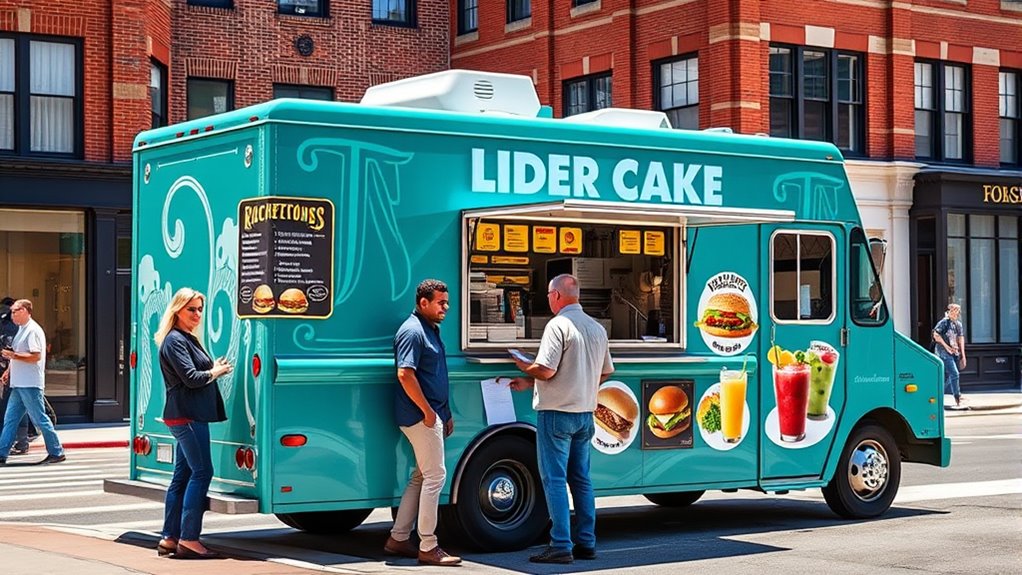
Planning permits and licenses is a vital step for operating a food truck in Manchester, NH. You’ll need a Food License from the NH Department of Health and Human Services, which costs between $150 and $225, depending on your classification. All mobile canteens and hot dog carts must also obtain a Mobile Food Permit from the Manchester Health Department—contact the City Clerk for details. Depending on where you operate, you might need a Peddler or Hawkers Permit, as well as a Parking Encumbrance Permit if parking in restricted areas. For event-based service, apply for Temporary Food Establishment Permits at least two weeks in advance. Make sure you operate from a permitted commercial kitchen, and be prepared for potential inspections and compliance with local health and fire safety regulations. Food License is required to operate legally in NH; ensures health and safety compliance. Additionally, understanding local health regulations can help prevent delays or violations during the licensing process.
Estimating Startup Expenses and Fees for Your Food Truck Venture
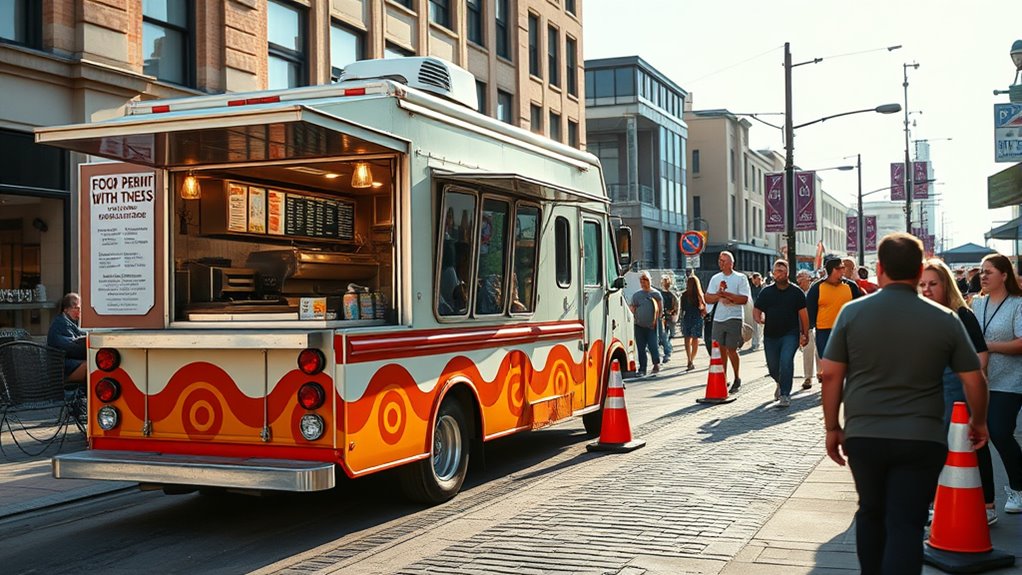
Estimating startup expenses and fees for your food truck venture is a crucial step in planning your business. Your costs can vary widely based on truck type, location, and equipment. New trucks with full customization in New Hampshire range from $85,000 to $175,000, while used or converted trucks cost between $15,000 and $60,000. Separate equipment like appliances and tools typically add around $45,000. Permits and licenses in NH tend to be lower than larger cities, but can still reach up to $30,000 in some cases. Initial inventory and supplies usually cost $2,000 to $3,000. Maintenance, fuel, and marketing expenses should also be factored into your budget. Additionally, understanding projector technology can help enhance your business’s marketing presentations or customer engagement strategies.
Identifying Prime Locations and Operating Zones in Manchester
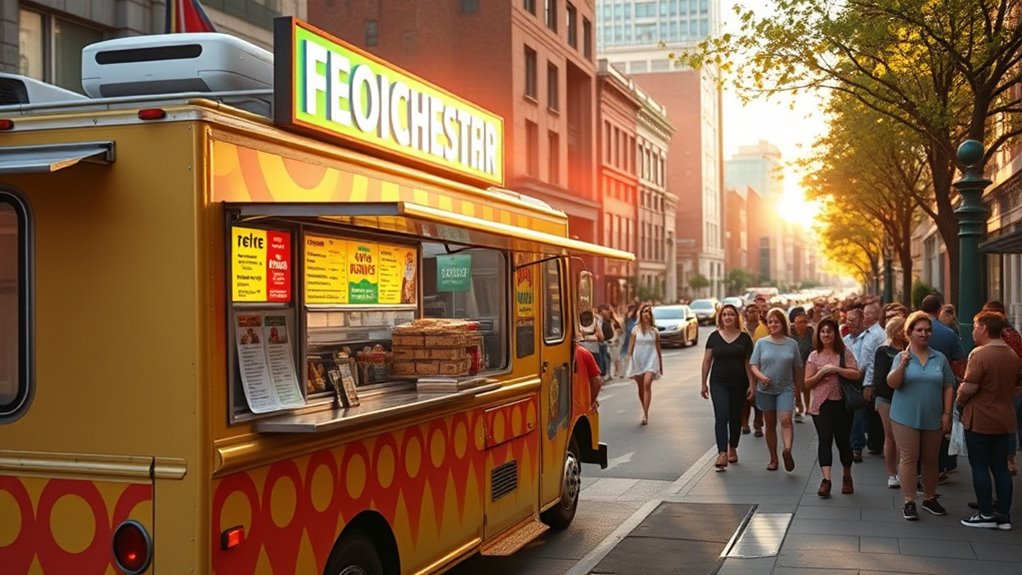
Finding the right locations and understanding the operating zones in Manchester can considerably impact your food truck’s success. You’ll need to focus on designated public plazas like Stanton Plaza and city parks, where bidding for spots is available. Establishing a presence in these areas can help attract foot traffic and build a loyal customer base. 1. Obtain written permission from landowners for private property use. 2. Stick to city-approved zones—mainly commercial districts and special event parks. 3. Avoid on-street parking, as selling from street spaces is illegal. 4. Secure annual permits and apply for temporary event permits at least two weeks in advance. Most public streets are off-limits, and operating in residential neighborhoods is prohibited. Your best bet is to build relationships with private property owners and stay within permitted zones to maximize your sales opportunities. Understanding local zoning laws is essential to ensure compliance and avoid fines or shutdowns. Additionally, researching permitted operating zones can help you identify the most profitable and compliant locations for your food truck.
Designing a Menu and Ensuring Food Safety Compliance
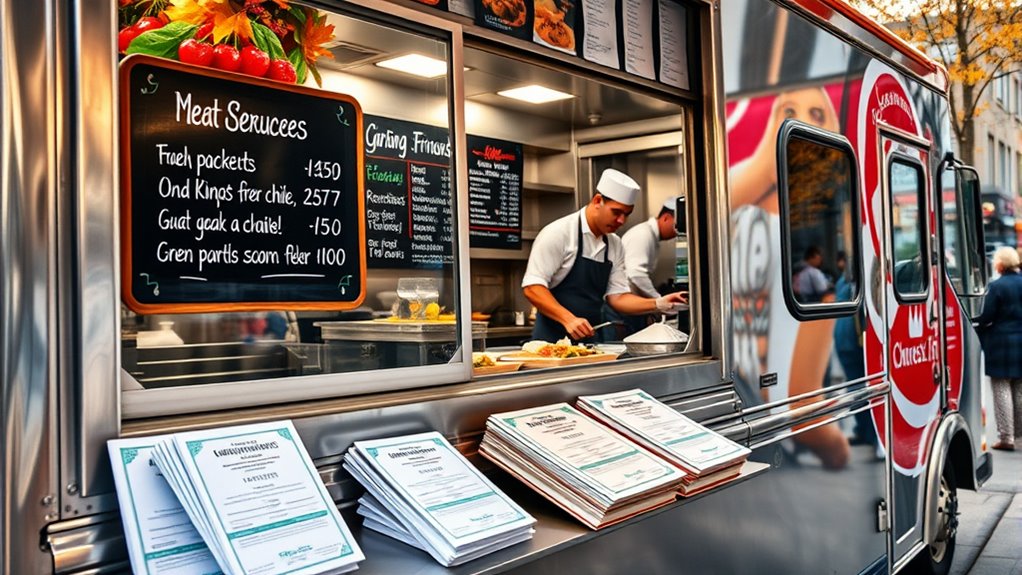
Designing an effective menu for your food truck requires careful planning to guarantee quick service, customer satisfaction, and profitability. Keep your menu concise with 5-7 core items that can be prepared in advance or assembled quickly on-site. Incorporate popular local flavors and seasonal ingredients to appeal to Manchester customers. Balance your menu by including vegetarian, gluten-free, or allergen-sensitive options. Price your dishes to cover ingredient costs, prep time, and local competition. To guarantee food safety compliance, operate out of a permitted commercial kitchen and obtain a Health Department permit, which costs around $50 annually. Maintain temperature controls, follow sanitation protocols, and store foods properly to prevent contamination. Train staff thoroughly on food handling, labeling, and allergen awareness to protect your customers and meet local health regulations. Utilizing performance cookies can help monitor food safety practices and improve compliance processes.
Effective Marketing Strategies to Boost Your Food Truck Business
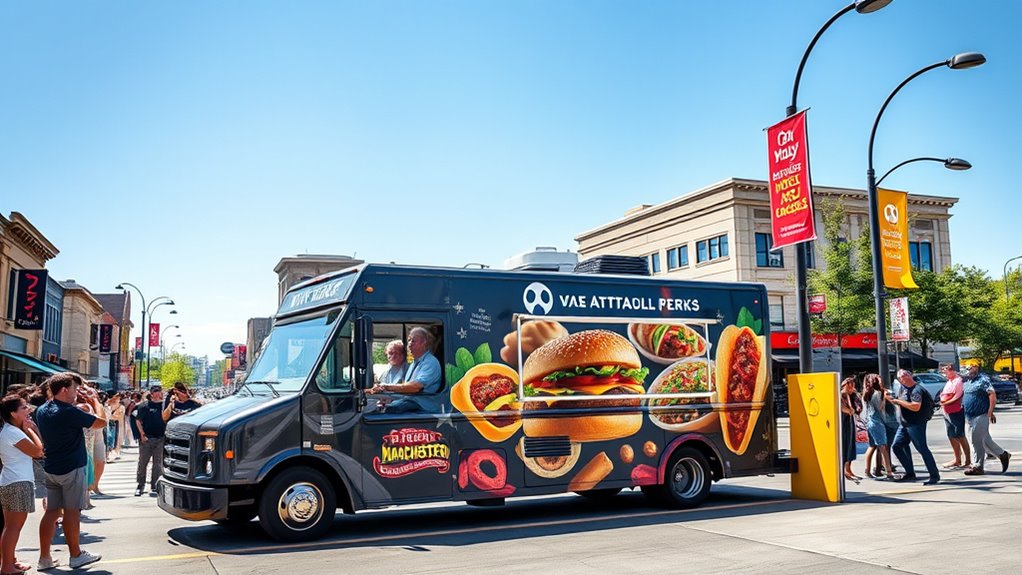
A well-crafted menu and strict food safety measures set the foundation for your food truck’s success, but effective marketing is what truly drives business growth. To boost your visibility, focus on these strategies:
- Leverage social media platforms like Facebook, which 75% of trucks use to connect with customers and increase sales by around 20%. Social media marketing is essential for engaging your audience and expanding your reach.
- Participate in local events and festivals, where 80% of trucks boost foot traffic and build brand loyalty through memorable experiences.
- Use data analytics to optimize your marketing, leading to a 25% higher return on investment and better targeting.
- Build an email list with loyalty programs, which can increase repeat visits by 30% and deepen customer engagement.
- Incorporate oxidative stress insights into your menu promotions by highlighting health-conscious options, attracting health-aware customers and setting your truck apart from competitors.
Implementing these tactics will attract more customers and grow your business effectively.
Staying Compliant: Legal Considerations and Ongoing Requirements
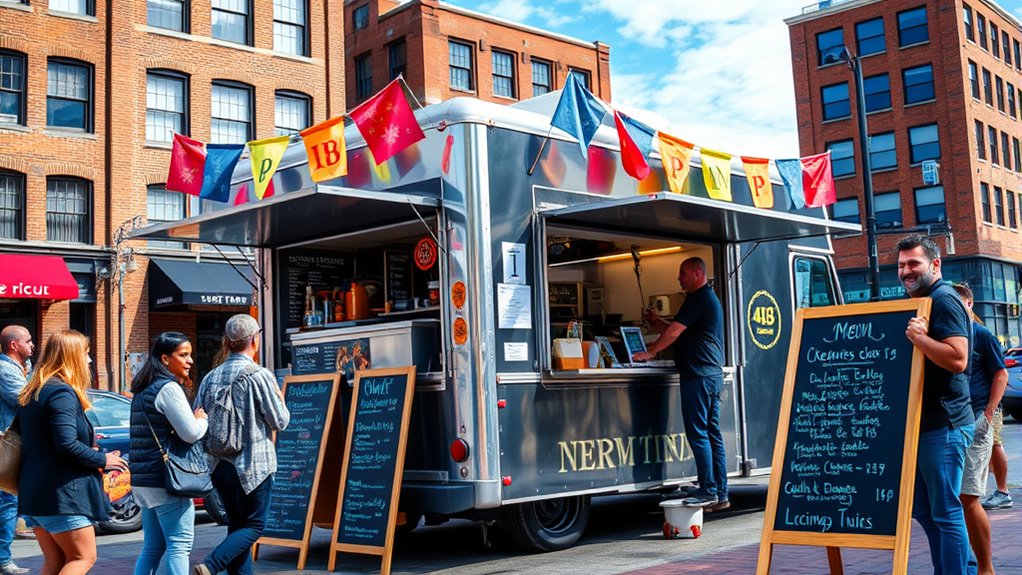
Staying compliant with legal requirements is essential for your food truck’s success in Manchester. You need a state license costing around $50, along with a mobile food permit from the Manchester Health Department. If you plan to attend events, apply for temporary food establishment permits at least two weeks in advance. All food prep must happen in a permitted commercial kitchen, as residential kitchens usually don’t meet health standards. You must post your permits visibly on your truck, showing your establishment name and permit number. Be aware of location restrictions—public parks and private property require permission, and on-street parking is illegal for food sales. Keep permits current, maintain documentation, and stay updated on local regulations to avoid fines and operational disruptions. Additionally, permits must be visibly posted in accordance with local regulations, ensuring transparency and regulatory compliance.
Frequently Asked Questions
How Long Does It Typically Take to Get All Food Truck Permits Approved in Manchester?
Getting all your food truck permits in Manchester usually takes between 14 and 90 days. You need to submit complete applications early, ideally two weeks before your planned event, to avoid delays. Multiple departments, like health, fire, and city officials, review your paperwork, which can extend the process. Planning ahead, providing all necessary documents, and staying in touch with city agencies will help speed things up.
Are There Any Specific Restrictions on Operating Hours for Food Trucks in Manchester?
You might wonder if there are strict rules about when you can operate your food truck in Manchester. Currently, there are no specific statewide or citywide curfews or hour restrictions. However, your operating hours depend on local permits, designated locations, and compliance with noise or disturbance ordinances. You need permission for certain spots, follow permit conditions, and consider event or location restrictions that may limit your hours.
Can I Operate a Food Truck at Multiple Locations Without Additional Permits?
Think of permits as the keys to Manchester’s vending doors. You can’t operate at multiple locations with just one permit; each site needs its own approval. You must get explicit permits or permissions for every spot you plan to serve. Skipping this step risks fines or shutdowns. So, plan ahead, coordinate with the Health Department, and secure all necessary permits for each location to keep your food truck rolling smoothly.
What Insurance Coverage Is Mandatory for Food Truck Owners in Manchester?
You need to have mandatory insurance coverage to operate your food truck in Manchester. This includes commercial auto insurance with at least $25,000 per person and $50,000 per accident for bodily injury, plus liability for property damage. Additionally, you must have general liability insurance to protect against claims of injuries or property damage. Ensuring these coverages are current and compliant is essential for maintaining your permits and avoiding legal issues.
Are There Grants or Financial Assistance Programs Available for New Food Truck Businesses?
Did you know that nearly 60% of small businesses rely on grants or loans to start? You can access federal programs like the Restaurant Revitalization Fund, offering up to $10 million, or local support from Manchester’s community development initiatives. SBA loans, crowdfunding, and private foundation grants can also help fund your food truck venture. Exploring these options boosts your chances of launching successfully without overwhelming costs.
Conclusion
Starting a food truck in Manchester can be a rewarding venture, especially with over 50 food trucks currently operating in the city. By securing the right permits, choosing prime locations, and crafting a standout menu, you can tap into this thriving scene. Remember, consistent marketing and compliance are key. With the right approach, you’ll be serving up success—statistics show food trucks generate over $2 billion annually nationwide. Get ready to hit the streets and make your mark!
